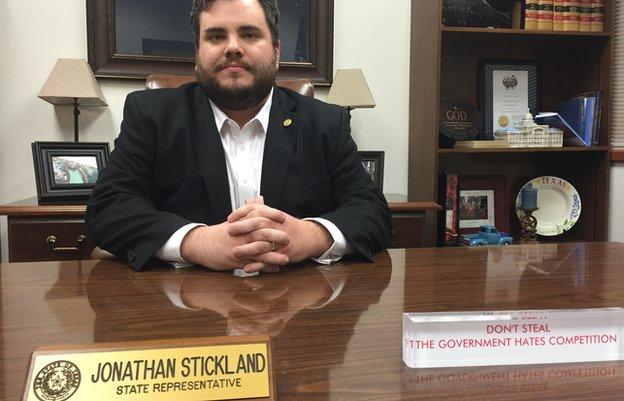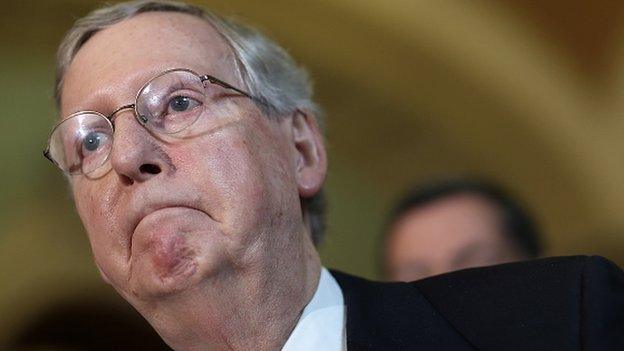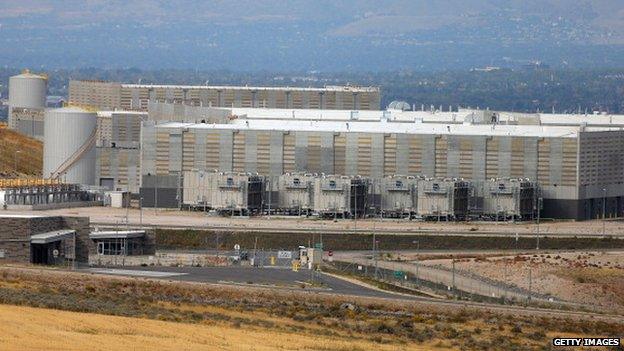US states take aim at NSA over warrantless surveillance
- Published
- comments

There's a sign on Jonathan Stickland's desk that reads: "Don't steal. The government hates competition."
These days Stickland, a Texas state representative, isn't spending most of his time worrying about the government "stealing" through high taxes or onerous regulation - standard political fare for the kind of conservatives who populate the state capitol in Austin.
Instead his cause has been what he sees as government theft of privacy - the unlawful acquisition by the National Security Agency of personal information in the form of metadata about electronic communications by US citizens.
The particular target of his ire is the Texas Cryptologic Center, an NSA facility located near San Antonio. He has proposed a state law, external cutting off the building's access to public utilities - water and electricity - until the agency ceases what he says is unconstitutional warrantless data collection.
"I believe the first role of government is to protect the personal rights and liberties of its citizens," says the Republican, who has represented a district near Dallas for two years. "Before we build a road or anything else, we have to ensure that those exist for every Texan."
"I believe that it is my responsibility as a representative at the state level to fight against that kind of tyranny," he continues. "Whether it's from the federal government or a foreign entity, it doesn't matter."
The Texas bill is just one of the most recent examples of a growing movement among states - both liberal and conservative - to end government support for NSA facilities.
Last year California became the first to pass what's been called a Fourth Amendment Protection Act. Its law prohibited the state from providing support to a federal agency "to collect electronically stored information or metadata of any person if the state has actual knowledge that the request constitutes an illegal or unconstitutional collection".
This year 15 other states have introduced some kind of anti-NSA legislation, including politically diverse locations like liberal Washington and Maryland and conservative Oklahoma and Mississippi.
The movement has been championed by the Tenth Amendment Center and its OffNow coalition, which provides support and model legislation to politicians like Stickland interested in challenging the NSA.
According to Mike Maharrey, communications director for the centre, the California law, with its "actual knowledge" provision, is significantly weaker than they had hoped - but a good first step in the nation's most populous state.
He says they came up with the suggested legislation because they don't trust the US Congress to do anything to keep the NSA in check. The Patriot Act, which authorises the NSA surveillance programme, is up for renewal in May, and Republican Senate Majority Leader Mitch McConnell has already proposed, external that it be extended to 2020.
"I'm not really faithful in things that are going on in Washington, DC," he says. "People can make a difference more rapidly and more readily at the state level."
He adds that state politicians are generally more responsive to their constituents. "A lot of phone calls make a state legislator really nervous," he says.

Senate Majority Leader Mitch McConnell has proposed extending the bill which allows for warrantless surveillance
Maharrey says his proposed legislation is just the latest example of a US tradition of states expressing their independence from an intrusive federal government. He says the movement's inspiration was the efforts of Northern states to undermine the federal requirement to return fugitive slaves prior to the Civil War.
"It's called the anti-commandeering doctrine," he says. "The federal government cannot force the states to provide personnel or resources to any federal regulation or federal act or federal process. If the feds want to do it they can do it, but they have to do it themselves."
Finding the power and water to run massive NSA data centres like the $2bn (£1.3bn) facility near Bluffdale, Utah, without state help would be a challenge. It's why, Maharrey says, the federal government - and allies in local law enforcement, which benefit from federal funds and information - fought so hard against Utah's anti-NSA legislation.
"When we dug into this we realized that there's this big web of interconnected cooperation between the states and local law enforcement and the federal government, and it's pretty nefarious," he says.
According to Curtis Haring, editor-in-chief of the website Utah Political Capitol, the Utah legislation had bigger problems than law enforcement opposition, however - it just wasn't very well written.
"It was very broad stroke legislation," he says.
Haring says that the Utah bill - and similar legislation in other states - would punish citizens by cutting off all state support to their local governments if those localities decided to provide support to the NSA.
For that reason he gave the bill an "F", external when grading this term's legislation.

The NSA Data Center in Utah relies on public utilities provided by the state
"Is the state so opposed to the data centre that it is willing to severely punish the 7,500 residents of Bluffdale?" he writes. "Or the one million residents of Salt Lake County based on the decisions of some government employees? If so, we as citizens should strongly look at the people running our state government."
Another objection raised to the anti-NSA legislation is that the strategy - denying state support to objectionable government activities - could open a Pandora's box where legislators use the tactic on other political targets, like Planned Parenthood offices that provide abortion counselling or agencies enforcing unpopular federal environmental regulations.
For Stickland, however, that's not a flaw it's a benefit.
"We need to get creative because we have a duty to our citizens regardless of the circumstances," he says. "Hopefully the federal government will get into its place and proper role when the states start fighting back."
According to Maharrey, legislation in five states - Texas, Maine, Washington, Alaska and Iowa - still have a chance of passing this year. And if no new states are successful this time, he says his organisation will regroup over the summer and plan another round of proposals when state legislatures reconvene next year.
"We didn't go into this expecting that we were going to win the war in one year," he says. "It's an educational process, and it's a process of helping legislators understand it and overcoming legal objections."